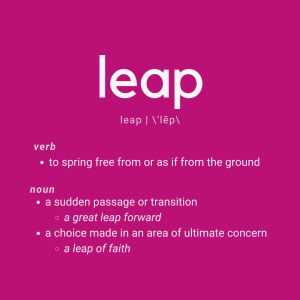Making the average workday sound super duper important.
Perhaps it’s my inborn disposition to want to challenge the status quo, but part of me is tired of hearing about “leadership.” I’m bored by the organizational and business speak that lauds high achievers, charismatic personae, innovative thinkers, strategic visionaries, integrative performers, and the like. Every working person is being told “leadership is the goal” – and we have to show that we have what it takes to be a “leader.” The pressure for every person in every job to strive to acquire this label has got me down. I’m over it. Done. Finished. Kaput.

In an average, functional, business context (which is the only one I’m thinking of for this post), leadership is an upgrade for the word “management” which is an upgrade from “administration.” Think about it: the degree is called an MBA, not an MBL. Over time, “administration” has sunk in importance. We now use the word “leadership” to inflate the status of the work we have to do everyday: organize, sort through, supervise, plan, execute and so on. Administration is now what assistants (formerly known as secretaries) do. We want to feel better and more important during the daily grind, so we up the amplitude on the language and get a new and improved version of what we’ve been doing for years. Suddenly, showing up every day and doing the work we’re paid for takes on a level of importance formerly reserved for activities such as containing large forest fires, confronting an onslaught of Huns or resurrecting one of the Pyramids.
I know that there is a cultural context for this adjustment in language. There are infinite variables in play when we think about how the language and perception of work has changed over the last several decades. The challenges of our working life have shifted from a largely industrial to an informational process – it can be an upsetting experience for our collective psyches to do a “hard days work” when a majority of the “labor” is done with the mind. It is hard work to write and code and design and teach and learn and collaborate and think and deliver something usable every day. But I wonder whether inflicting the language and ideals of leadership onto every aspect of our jobs isn’t a bit of a hoax as well as an under appreciation of the day-to-day work we do that doesn’t need to be led.
Aside from the fact that if everyone is leading there will be no one following (see Barbara Kellerman’s excellent book Followership for more on this), I think we are using a faulty cognitive frame when we say we want people to be “leaders.” What it seems we want when we describe things like efficacy, responsibility, collaboration, decisiveness, charisma, wisdom, insight and every other descriptive term that we assign to “leaders” is that we want present adults. We want reliable, self-managing, emotionally responsible, cognitively competent grown-ups who will consistently show-up and help get things done.

The problem with the terms “grown-up” or “adult” is they, too, have distorted meanings in our culture. If you’re behaving as an adult, the implication is you are automatically not having fun. Furthermore, you are likely quelling everyone else’s good time in the process. The potential benefits of adult behavior – responsibility, competence, skill, maturity, systems thinking, cooperation, compassion, etc. – are held hostage in our minds by the associated risks of being a grown-up – being totally lame, disinterested, unimaginative and (eeek!) old.
Here’s what I propose: every time you use the word “leadership” at work, reflect on what you mean when you say it. Is it really that you want someone to be at the front to direct, guide and show the way? Or do you want someone to be present and responsible, engaged and productive? Think about and define what you mean and what you want. It’s a good exercise in leading your own mind through the land of business hyperbole.





